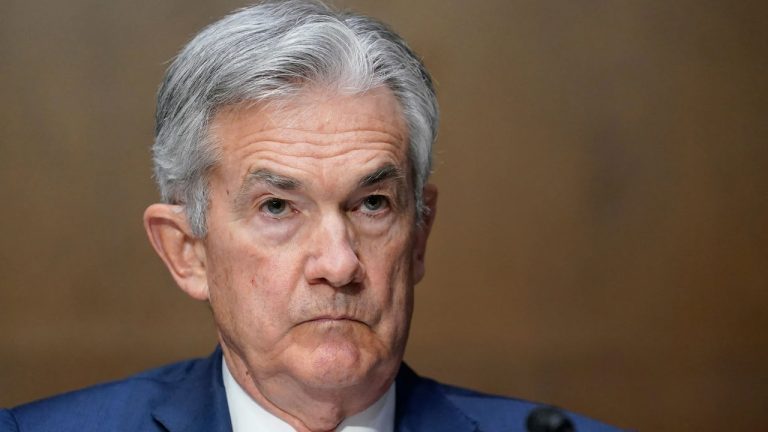
After the U.S. central bank refrained from boosting interest rates last week, investors now anticipate two more hikes that may elevate the federal funds rate to 5.6% by the year’s end, climbing 50 basis points (bps) from its present level. CME’s Fedwatch tool indicated on Tuesday that market predictions imply a 25bps increase during the next Federal Open Market Committee (FOMC) meeting set for July 25 and 26.
Federal Reserve Pauses, but 2 Rate Hikes Loom, 76.9% Probability of a 25bps Increase in July
Consequent to ten uninterrupted rate hikes since March 2022, the U.S. Federal Reserve decided to halt in June but acknowledged that additional increases were anticipated in 2023. Fed Chair Jerome Powell announced that “nearly all committee participants view it as likely that some further rate increases will be appropriate this year.” Currently, the federal funds rate is at a 16-year peak, and although there was no rise in June, the impact of the previous ten is evident among market participants.
Inflation in the U.S. has decelerated for 11 consecutive months but remains elevated at 4%, while the interest rate for a 30-year mortgage ranges between 6.99% and 7.14%. The countrywide average for a 30-year loan term is 7.08%. This implies that for every $100,000 borrowed, debtors must pay $660 to $685 monthly in interest. With the federal funds rate at 5% to 5.25%, an extra two rate hikes totaling 50bps would likely push lending rates higher, making credit in the U.S. considerably tighter.
During the last FOMC meeting’s press conference, Powell mentioned that Fed board members did not reach a consensus on July. “We didn’t make a decision about July,” Powell informed reporters last Wednesday. “I do expect that it will be a live meeting. It may make sense for rates to move higher but at a more moderate pace, but we have made no decision about a hike or pause at the July meeting.”
Despite earlier forecasts of a shift, most market analysts do not foresee a rate reduction this year. Asawari Sathe, Vanguard’s senior economist, expresses skepticism that the federal funds rate will be lowered in 2023. “We believe inflation will continue to moderate but remain above 3% through year-end, and unemployment will trend higher to a still reasonable 4.5%,” the Vanguard economist penned. Vanguard’s machine learning prediction tool also anticipates that the Fed will not reduce rates until the following year. Sathe stated:
Vanguard’s model anticipates that the Fed won’t be in a position to cut rates until the middle of 2024.
On Tuesday, CME’s Fedwatch presented a 76.9% probability of the Fed raising the rate by 25bps at the July FOMC meeting. Approximately 23.1% expect no alteration to transpire in July and that the rate will stay unchanged at 5% to 5.25%. Should the 5.6% threshold be attained within this year, it will surpass the Federal Reserve’s previous March prediction by a notable 50bps.
However, by the conclusion of May, numerous economists started asserting that the central bank would undergo a significant shift in its approach. “Chair Powell right now does not want to talk about (reducing rates),” conveyed Ian Shepherdson, the chief economist at Pantheon Macroeconomics, to his clients just last month. The Pantheon executive added:
But that will change; the Fed will do what the data tell them to do, and the data are heading south.
What are your predictions for the Federal Reserve’s next moves? Share your thoughts and opinions about this subject in the comments section below.









